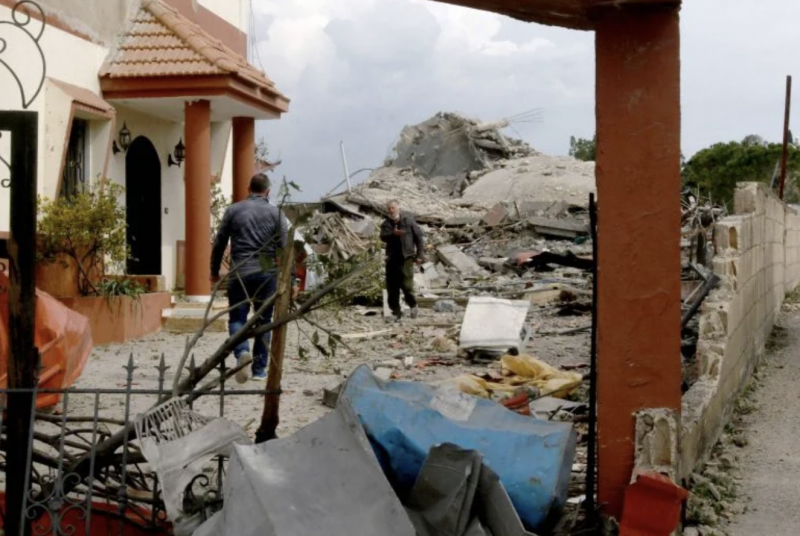
Residents assess the damage after an Israeli strike on the village of Jibsheet, south Lebanon, Feb. 27, 2024. (Credit: Mahmoud Zayyat/AFP)
The potential truce slowly taking shape in Gaza, possibly before the onset of Ramadan in roughly 10 days, is intricately tied to the conflict initiated by Hezbollah in southern Lebanon.
However, as of now, there are no indications that the involved parties will adhere to this principle. With significant stakes and ongoing Israeli threats, the situation remains highly uncertain, as does the future and scope of the conflict.
Hezbollah has repeatedly stated its willingness to halt hostilities against Israel if a ceasefire is reached in Gaza.
Conversely, the Israeli stance presents a different narrative.
Israeli Defense Minister Yoav Gallant said on Sunday that a potential ceasefire in the Gaza war would not alter Israel’s objective of pushing Hezbollah away from its northern border.
The question persists: Which of these positions will ultimately prevail?
The predicament primarily concerns Hezbollah. Throughout the conflict, the party has strived to contain the confrontation within a somewhat limited scope, aiming to avert a broader war, which the Israeli state consistently threatens if its objectives are not met through diplomatic channels.
Consequently, a ceasefire in Gaza, even if temporary, would somewhat benefit Hezbollah.
“Hezbollah has yet to demonstrate its capacity to endure a protracted conflict,” said Mohannad Hajj Ali, a researcher at Carnegie. “Particularly as the passage of time tends to favor Israel, which is now willing to deploy as many troops as needed to the northern border.”
Another factor to consider is the growing discontent — the magnitude of which is challenging to gauge — among the residents of southern Lebanon due to the casualties and devastation incurred since the conflict’s onset.
A ceasefire would also provide Hezbollah with an opportunity to afford its fighters some respite. However, while the party may be willing to pursue this path, there is no assurance that Israel will comply.
Guarantees
For the Israeli government, as long as the war cabinet’s objectives remain unfulfilled, there’s no rationale for a temporary halt to hostilities in southern Lebanon.
“From Israel’s perspective, it’s not in its interest to halt operations against Hezbollah, even if a ceasefire is declared in Gaza,” said Nicholas Blanford, a researcher at the Atlantic Council. “The 80,000 settlers won’t be able to return home even if Hezbollah agrees to respect the ceasefire for a while.”
This approach has led several analysts to suggest that Israel aims to distinguish between the two fronts. While it may accept a temporary ceasefire in Gaza, it seeks a permanent cessation of hostilities in Lebanon — a position Hezbollah appears unwilling to consider at this time — even if it requires achieving it through military action.
The recent escalation, marked by unprecedented strikes in Baalbeck in the Bekaa on Monday, may signal a prelude to further developments. This came after Hezbollah downed one of Israel’s most advanced drones in Iqlim al-Tuffah — the Hermes 450, considered a prized asset of the Israeli military.
Some observers interpret these operations as strategic maneuvers aimed at bolstering their respective positions in ongoing negotiations toward a settlement.
However, reaching an agreement remains elusive, especially in Lebanon.
Israel is pressing for security assurances in the area south of the Litani River. This includes demands for Hezbollah fighters to withdraw from the region and for a more robust role for peacekeeping forces (UNIFIL).
Additionally, Israel seeks a larger deployment of the Lebanese Army to secure its northern border and facilitate the return of displaced persons.
The French proposal, recently presented to Lebanese authorities, encompasses a series of requests aimed at de-escalating tensions and enhancing security in the region.
Among its provisions is the call for the dismantling of all structures belonging to armed groups near the Blue Line on the border, including containers, small towers and tents.
Additionally, the proposal stipulates the withdrawal of fighters, particularly Hezbollah’s elite unit, Al-Radwan Force, along with their heavy weaponry — such as anti-tank systems and long-range missiles — to a distance of at least 10 kilometers north of the Blue Line.
“We are not concerned by the French proposal, and we have declined to accept it, despite being informed of its contents,” said Hezbollah spokesperson Mohammad Afif Nabulsi. “Our stance remains clear: A cessation of hostilities in Gaza, not just a temporary truce, must precede any settlement.”
“Regarding the document’s content, it predominantly echoes Israeli demands without addressing Lebanon’s interests or gains. These demands appear more as coercive measures rather than a basis for mutual agreement,” he added. “They represent Israeli interests imposed under duress.”
Military solution
“There’s no possibility of Hezbollah relinquishing its missile arsenal,” said Mohammad Obeid, a political analyst with close ties to Hezbollah. “Israel holds undeniable military air superiority in this conflict, while Hezbollah’s deterrent strength lies in these missiles.”
“Should the party agree to withdraw them, the balance of deterrence would collapse,” he added.
He views the situation as “at an impasse.”
This sentiment aligns with military strategist and army General Khalil Helou’s assertion that “at present, the only viable solution appears to be a military one.”
In his strategic calculations, Hezbollah anticipates that a large-scale war in Lebanon is unlikely.
This confidence stems partly from indications provided by American officials behind closed doors, suggesting they would not permit such a scenario.
Additionally, Hezbollah relies on perceived “contradictions” within the Israeli cabinet and believes its adversary is engaging in brinkmanship.
“Let’s not deceive ourselves,” Helou said. “[Israeli Prime Minister] Benjamin Netanyahu has the support of the majority of the population and most of the cabinet favoring war.”
“Whatever prevailed before Oct. 7 is irrelevant,” he added. “Today, Israelis are setting aside their differences to pursue their objectives.”
This article was originally published in L'Orient-Le Jour. Translated by Sahar Ghoussoub.